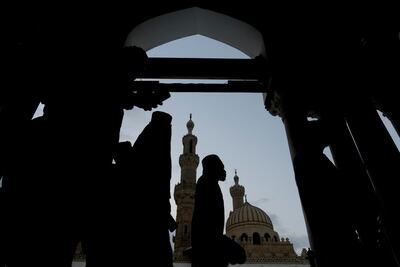After months of delay, Egypt's national dialogue will begin on May 3 — a political milestone under President Abdel Fattah El Sisi that could potentially bring more freedoms and inclusion to the most populous Arab nation.
Significantly, the outcome of the dialogue would set the tone for presidential elections due next year, possibly giving candidates enough leeway to freely campaign.
Mr El Sisi, 68, has yet to announce whether he will run, although he is widely expected to do so and would be the favourite to repeat his 2014 and 2018 wins.
With a little more than a year to go, the election is already influencing the political scene.
On Monday night, Mr El Sisi welcomed a recommendation made by the dialogue’s board of trustees to extend the judiciary’s supervision of voting beyond the 10 years set in Egypt’s 2014 Constitution, which expires in January.
“I reassure everyone that I will take into consideration what was discussed in yesterday’s session [by the trustees] in relation to the legislative amendment that allows full supervision by the judiciary of the election process,” Mr El Sisi wrote on Facebook.
“I have directed the government and relevant state institutions to study the proposal and the mechanisms of implementing it.”
Since Mr El Sisi's call for the national dialogue 11 months ago, he has eased some government’s controls on the country of 104 million, released at least 1,200 of his critics held in pretrial detention and allowed a carefully measured margin of freedoms.

Critics living in exile abroad have been allowed back into the country.
Families have in recent weeks been allowed to visit jailed relatives for the first time since their incarceration as many as five or seven years ago, rights activists said.
Authorities have also restored access to some of the hundreds of independent online news outlets previously blocked.
Mr El Sisi, who wants the dialogue to chart Egypt’s political future, has said he would attend the proceedings at a later stage of the process. He has also pledged to adopt recommendations he deemed constructive for the building of a “new republic”, the phrase coined to refer to the Egyptian leader’s vision of a modern and efficient nation.
“Our party and other political forces participating in the national dialogue are working towards the creation of a democratic climate for the upcoming election,” said Yasser El Hodeiby of the Wafd party, one of the nation’s oldest.
Extending the judiciary’s supervision of elections, Mr El Hodeiby said, “guarantees the transparency of the voting process and puts the minds of the sceptics at ease”.

However, the moderately encouraging signs of a credible and competitive presidential election next year should not give rise to ambitious expectations like a change in leadership, said Negad Borai, a veteran rights lawyer and one of the national dialogue’s 19 trustees.
“But the election can be conducive to the emergence of new forces that defines the nation’s next political phase.”
Mr Borai’s hopes for a credible vote next year is echoed by Mohammed Anwar Sadat, a prominent politician and leader of the opposition Reform and Development party, who has been instrumental in the release of government critics held in pre-trial detention.
“We want to see a larger turnout and several candidates who compete against each other regardless of their chance of winning,” he said.
“We also want to end the distrust and conspiracy theories dominating the minds of Egyptians.”
Opposition parties, mostly disjointed and generally lacking a popular base to speak of, are yet to announce their candidates for next year’s election.
A senior member of the largest opposition coalition — the Democratic Civilian Movement — said in-house discussions of the elections have begun but remain at an early stage.
On Monday night, the coalition made a thinly veiled threat it would boycott the dialogue unless “agreed upon measures, particularly the release of political detainees, are completed”.
The movement has said that not everyone on a list of pre-trial detainees it submitted to authorities have been released and it also wants the government to make more goodwill gestures before the start on May 3 of the dialogue.
Mr El Sisi has yet to speak in public about next year’s vote, but he has recently been making public appearances that resembled those of a politician on the campaign trail.
In the past 10 days alone, he has visited the police academy at dawn to talk to cadets and their families, he celebrated Mother’s Day at a well attended and emotional event, visited the new capital east of Cairo where he shared Ramadan’s pre-dawn Sohoor meal with workers after touring the city’s opulent, 800-million-pound Quranic centre.
Last week, he addressed a rally attended by 60,000 supporters to launch a programme to feed 25 million Egyptians during Ramadan.
“I love you, too, very much,” he responded to the cheering crowd at the stadium.
“God knows, I love Egypt very much.”

